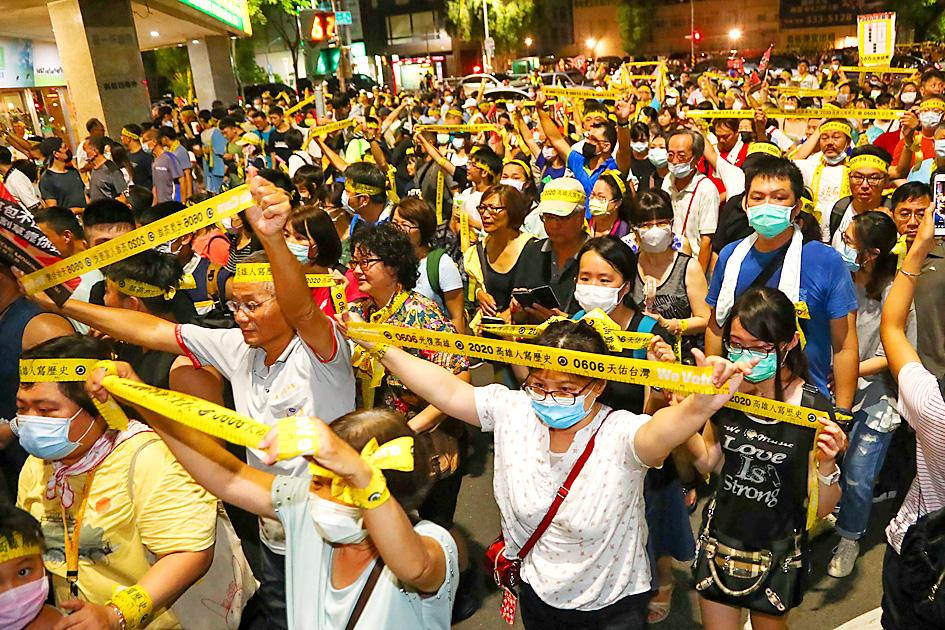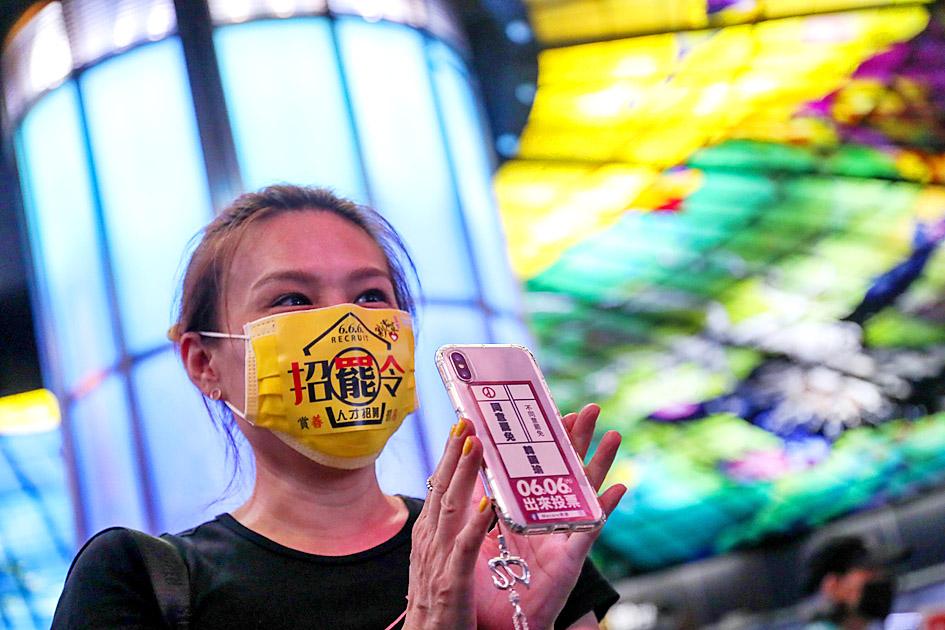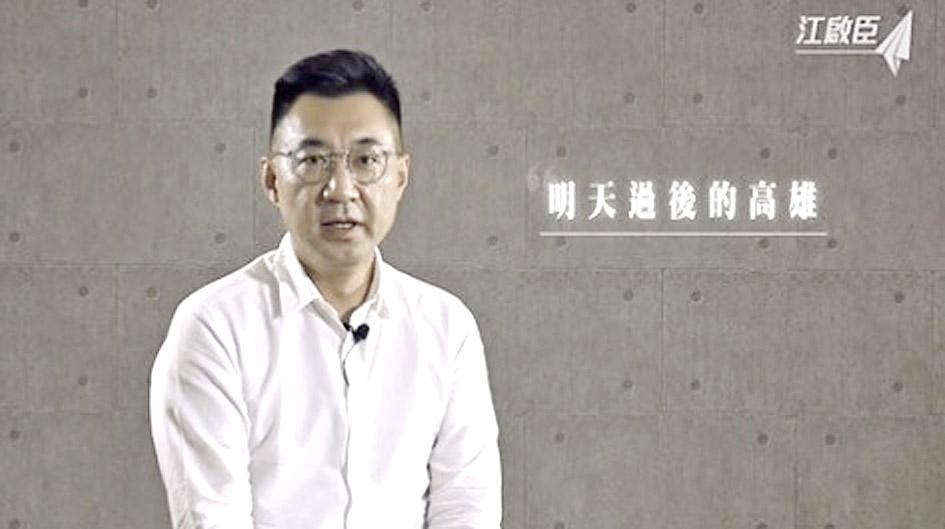Groups advocating the recall of Kaohsiung Mayor Han Kuo-yu (韓國瑜) last night made a final push with a rally, while the Chinese Nationalist Party (KMT) released a video appeal to voters’ softer side.
The Central Election Commission in April verified public endorsement for a recall petition to remove the KMT mayor from office. The recall vote is to be held today.
Civic groups initiated the recall petition in June last year, after Han announced a presidential bid less than six months into his mayoral term.

Photo: CNA
The groups yesterday started with a procession through Kaohsiung, gathering at Yuandi Temple in Zuoying District (左營) before setting out toward Nanzih District (楠梓), with supporters lining the streets to greet them.
The recall campaign culminated with an evening rally in front of the Kaohsiung MRT metropolitan railway system’s Formosa Boulevard Station, which included another procession on the banks of the Love River (愛河), with participants chanting: “Vote on June 6. Retake Kaohsiung.”
Chen Kuan-jung (陳冠榮), a convener of the Wecare Kaohsiung coalition, called on the city’s residents to “be brave, be stubborn and show some effort to be responsible.”

Photo: CNA
“We will determine a new future for Kaohsiung on June 6,” Chen said.
The Kaohsiung City Election Commission has said that by law, if 25 percent, or about 575,000, of the city’s eligible voters, about 2.3 million residents, vote in favor of recalling Han and their ballots exceed those against the motion, the vote would be considered valid.
The recall campaign has strong backing from Democratic Progressive Party (DPP) politicians.

Photo: Screengrab from Facebook
DPP Kaohsiung chapter director Chao Tien-lin (趙天麟) yesterday said that the recall vote would not be along political lines, nor is it for or against Han, but is rather about creating a new standard of democratic responsibility.
“The recall vote is making a statement that politicians, after being voted into office, should dedicate their term to that job,” Chao said, adding that “should they abandon [their duties] midway, or allow city affairs to slide, then the turnout rate for recall votes would reflect the standards of our democracy.”
Separately yesterday, KMT Chairman Johnny Chiang (江啟臣) posted a video on Facebook titled Kaohsiung the Day After Tomorrow (明天過後的高雄), in which he appealed to Kaohsiung residents to vote against recalling Han.
“We hope the people of Kaohsiung will, with their votes, retain a professional administrative team who will further contribute their expertise for the city’s residents,” Chiang said, speaking in Hoklo (commonly known as Taiwanese) throughout the video.
The ability to recall officials gives voters the power to combat corruption and illicit behavior, and should not be used for political infighting, but as the public are thus empowered, the KMT would respect whatever decision residents make today, Chiang said.
The city’s residents must decide whether it is fair for political forces to compel the public to judge an administrative team’s capabilities based on their efforts over one-and-a-half years, when they were supposed to work for four, he said.
Elections and their results, like politics, are temporary affairs, and the KMT chooses instead to focus on Kaohsiung’s ability to continually grow and improve, he added.
Kaohsiung Information Bureau Director-General Cheng Chao-hsin (鄭照新) said that Han would respect the results of the recall election.
The Kaohsiung City Government declined to comment on rumors that Han, leading the entire administrative team, would bow to Kaohsiung residents today, regardless of the outcome of the poll.
A KMT official said on condition of anonymity that regardless of the outcome, Chiang would be in Kaohsiung to hold a news conference to apologize to the city’s residents.
The party would shoulder responsibility for recruiting Han as its presidential candidate, the official said.
Additional reporting by Chen Chun, Ko You-hao, Peng Wan-hsin and CNA

ROLLER-COASTER RIDE: More than five earthquakes ranging from magnitude 4.4 to 5.5 on the Richter scale shook eastern Taiwan in rapid succession yesterday afternoon Back-to-back weather fronts are forecast to hit Taiwan this week, resulting in rain across the nation in the coming days, the Central Weather Administration said yesterday, as it also warned residents in mountainous regions to be wary of landslides and rockfalls. As the first front approached, sporadic rainfall began in central and northern parts of Taiwan yesterday, the agency said, adding that rain is forecast to intensify in those regions today, while brief showers would also affect other parts of the nation. A second weather system is forecast to arrive on Thursday, bringing additional rain to the whole nation until Sunday, it

LANDSLIDES POSSIBLE: The agency advised the public to avoid visiting mountainous regions due to more expected aftershocks and rainfall from a series of weather fronts A series of earthquakes over the past few days were likely aftershocks of the April 3 earthquake in Hualien County, with further aftershocks to be expected for up to a year, the Central Weather Administration (CWA) said yesterday. Based on the nation’s experience after the quake on Sept. 21, 1999, more aftershocks are possible over the next six months to a year, the agency said. A total of 103 earthquakes of magnitude 4 on the local magnitude scale or higher hit Hualien County from 5:08pm on Monday to 10:27am yesterday, with 27 of them exceeding magnitude 5. They included two, of magnitude

CONDITIONAL: The PRC imposes secret requirements that the funding it provides cannot be spent in states with diplomatic relations with Taiwan, Emma Reilly said China has been bribing UN officials to obtain “special benefits” and to block funding from countries that have diplomatic ties with Taiwan, a former UN employee told the British House of Commons on Tuesday. At a House of Commons Foreign Affairs Committee hearing into “international relations within the multilateral system,” former Office of the UN High Commissioner for Human Rights (OHCHR) employee Emma Reilly said in a written statement that “Beijing paid bribes to the two successive Presidents of the [UN] General Assembly” during the two-year negotiation of the Sustainable Development Goals. Another way China exercises influence within the UN Secretariat is

Taiwan’s first drag queen to compete on the internationally acclaimed RuPaul’s Drag Race, Nymphia Wind (妮妃雅), was on Friday crowned the “Next Drag Superstar.” Dressed in a sparkling banana dress, Nymphia Wind swept onto the stage for the final, and stole the show. “Taiwan this is for you,” she said right after show host RuPaul announced her as the winner. “To those who feel like they don’t belong, just remember to live fearlessly and to live their truth,” she said on stage. One of the frontrunners for the past 15 episodes, the 28-year-old breezed through to the final after weeks of showcasing her unique